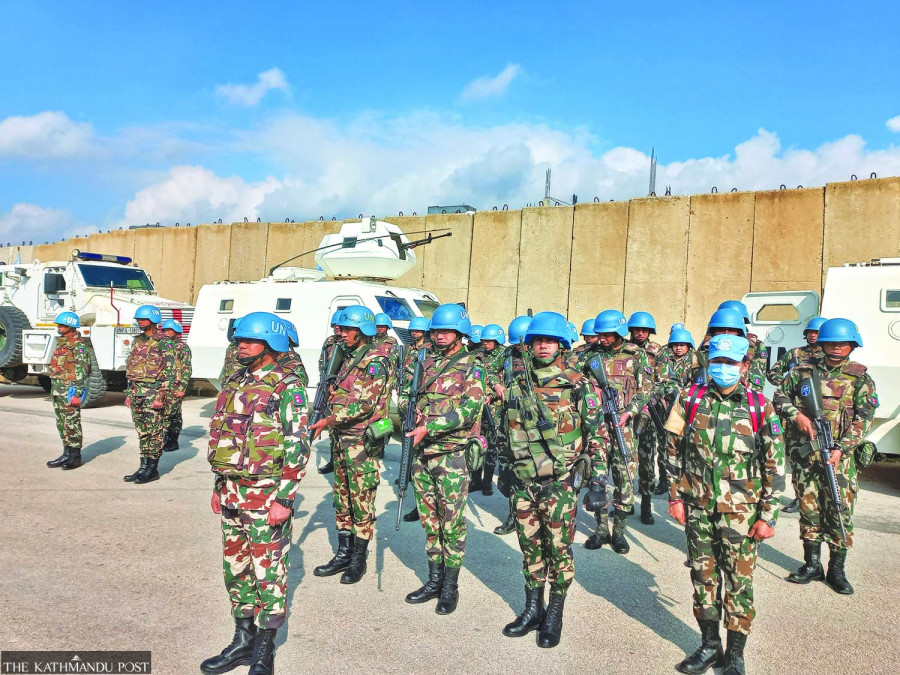National
New batch of Nepali peacekeepers in Lebanon
Brigadier General Melchor Marin Elvira of Spain welcomed the Nepali delegation to the mission on Monday.
Jagdishor Panday
In Lebanon this past year, Nepali soldiers worked day in and day out to establish peace along the sensitive ‘Blue Line’, the border between Lebanon and Israel that stretches 120km. A contingent of Nepal Army peacekeepers has been playing an important role in controlling the conflict there for a year. The area is located to the south-east of Beirut, the capital of Lebanon.
The 850-strong Gorakh Box Battalion, led by Chief Lieutenant Colonel Bikas KC from Nepal, has completed a year of its service. And the Purano Gorakh Battalion, which is under the command of another Lieutenant Colonel Anil Budhathoki, has come to the conflict-ridden areas to take charge for another year. As many as 872 people are working as military observers and staff officers in this mission.
“This peacekeeping mission is in a very sensitive area,” KC noted, in a conversation with the Post recently. “Here, the Nepal Army is carrying out the responsibility given by the UN. Our aim is to maintain peace in both countries.”
The main responsibility of Nepali peacekeepers is to maintain peace along the ‘Blue Line’ that was established through a UN resolution on June 7, 2000. The line was drawn along the disputed border between Israel and Lebanon in order to ease the conflict between them. The Nepal Army is working as part of the ‘United Nations Interim Force in Lebanon’ (UNIFIL).
After Nepal became a UN member in 1955, a five-member Nepali military came to Lebanon for the first time as observers.
This mission was established in 1978 according to the resolution of the UN Security Council in view of the conflict between Lebanon and Israel. The Nepal Army has been working under it since its inception. After the withdrawal of the Israeli army from Lebanon in 2002, the Nepal army withdrew from the mission in line with the UN plan to deploy only minimal forces.
But again at the call of the UN, after the war between Hezbollah (Lebanon's armed party) and Israel in July 2006, the UN Security Council passed a resolution and in 2007, the Nepali army arrived in Lebanon, once again.
The Nepali army is deployed in the south-east of Lebanon. There are armies of 48 countries of the world in this UNIFIL.
Nepali Army is under the ‘Sector East’ area of UNIFIL. As the head of ‘Sector East’, Brigadier General Melchor Marin Elvira of Spain welcomed Nepal's Brigadier General Johnson Khadka, who is also the head of the Nepali delegation this Monday.
“The Nepalese army is an experienced force that has been establishing peace in this area for a long time,” the Spanish Brigadier General Elvira said at the meeting.
Brigadier General Khadka in turn said that the Nepal Army will strengthen its role in establishing peace and that it invites cooperation of all.
The Nepali Army operates in an area of responsibility of about 96 square km and works primarily in seven municipalities and one village of South-Eastern Lebanon.
During its UN peace period of over a half-century, Nepal Army has covered 44 UN missions involving 1,42,585 Nepali personnel. The first Nepali contingent, Purano Gorakh Battalion, was deployed in Egypt in 1974.
The Nepali Army has contributed to senior appointments at the UN Department of Peacekeeping Operation and Force Headquarters. The Army has also deployed military contingents, military observers and staff officers in different peacekeeping missions around the world. During this, a total of 71 Nepal Army personnel have been martyred and another 66 have been rendered disabled.




 22.65°C Kathmandu
22.65°C Kathmandu













